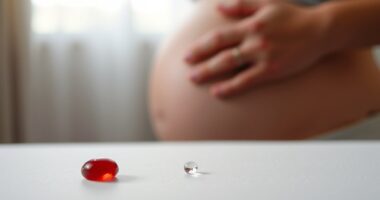During pregnancy, you’ll notice significant changes in your hair. Increased hormone levels lead to more hair in the growth phase, which makes it thicker and shinier. You might also experience changes in texture, with your hair becoming straighter or curlier. However, be prepared for postpartum hair loss as hormonal shifts occur after childbirth. Adjusting your haircare routine can help manage these changes. There’s plenty more to learn about your hair’s unique journey during this time.
Key Takeaways
- Hormonal changes during pregnancy increase estrogen and progesterone levels, leading to thicker and fuller hair.
- Hair texture may change, becoming straighter, wavier, or curlier due to fluctuations in hormonal levels.
- Unwanted hair growth can occur in unexpected areas, but these changes are generally temporary during pregnancy.
- Postpartum hair loss, known as telogen effluvium, often occurs as hormones return to pre-pregnancy levels.
- Adjusting haircare routines with appropriate products can help manage changes and maintain hair health throughout pregnancy.

During pregnancy, as your body undergoes various hormonal changes, you might notice significant shifts in your hair’s growth and texture. These changes primarily stem from increased levels of hormones like estrogen and progesterone, which influence your hair follicles. You may find that more of your hair follicles stay in the anagen phase, the active growth stage, leading to thicker and fuller hair. This means fewer strands are in the telogen phase, where shedding occurs, so you may experience less hair loss while pregnant.
As you navigate these months, you might also observe changes in your hair’s texture. Hormonal fluctuations can alter the shape of your hair follicles, making your hair straighter, wavier, or curlier than before. This variability could surprise you, especially if you have a genetic predisposition that plays a role in how your hair responds to these hormonal shifts. Additionally, increased sebum production can give your hair a shinier appearance, adding to the overall luscious look.
However, not all hair changes during pregnancy are purely positive. While you may enjoy the thicker locks, you could also experience hair growth in unexpected places on your body. With hormonal changes, your hair growth patterns can shift, leading to increased hair in areas like your belly or face. It’s essential to embrace these changes as part of the journey, knowing that they’re typically temporary.
Once you give birth, though, you might face the opposite effect. Many women experience postpartum hair loss, often referred to as telogen effluvium. This excessive shedding usually happens due to significant hormonal shifts as your body returns to its pre-pregnancy state. If you’re breastfeeding, this can further influence your hair growth and loss patterns, which may feel overwhelming at times.
Managing these changes can involve simple adjustments to your haircare routine. If your hair feels greasier, you might find clarifying shampoos helpful. For drier or curlier hair, moisturizing masks can keep your locks hydrated.
Frequently Asked Questions
Can Hair Color Change During Pregnancy?
Yes, your hair color can change during pregnancy! Hormonal fluctuations might lead to increased melanin production, causing your hair to darken or lighten.
You may notice unpredictable changes, with some women experiencing a significant shift from their usual shade. While these changes can be surprising, they’re typically temporary and often revert after childbirth.
If you’re considering dyeing your hair, it’s best to consult a professional to ensure safety during this time.
Is It Safe to Dye Hair While Pregnant?
If you’re considering adding a splash of color to your tresses, you might be wondering about safety during pregnancy.
Most experts agree that dyeing your hair is generally safe, especially when you wait until the second trimester.
Just remember to use it in well-ventilated spaces, wear gloves, and do a strand test first.
While enjoying your new look, keep an eye on how your skin reacts to any products you choose.
Do Pregnancy Hair Changes Affect Postpartum Hair Health?
Yes, pregnancy hair changes can affect postpartum hair health. When you experience increased growth during pregnancy, a sudden drop in hormones after childbirth may lead to noticeable hair loss.
This condition, known as telogen effluvium, can be distressing. However, maintaining a balanced diet, gentle hair care, and managing stress can help you recover more quickly.
How Can I Manage Excessive Hair Shedding Postpartum?
So, you’re dealing with excessive hair shedding postpartum, huh?
Congratulations! You’ve just unlocked the “Mop-Your-Floor” hair mode!
To manage this, focus on a balanced diet, stay hydrated, and keep your hair care routine gentle.
Ditch those tight hairstyles and heat tools—they’re not your friends right now.
Consider scalp massages to pamper those roots.
If it doesn’t get better after a year, consulting a professional might just save your sanity—and your hair!
Are There Specific Hairstyles Recommended for Pregnant Women?
For pregnant women, choosing the right hairstyle can make a big difference. You might love a layered bob for its volume and easy maintenance.
Try a wraparound ponytail to keep hair out of your face, or tousled waves for a stylish touch with minimal effort. A donut topknot prevents tangling, while fringes can complement your changing face shape.
Opt for low-maintenance styles like messy side buns or classic milkmaid braids to stay comfortable and chic.
Conclusion
In conclusion, pregnancy can bring about surprising changes in your hair, both beautiful and challenging. Did you know that about 90% of women experience thicker, fuller hair during pregnancy due to hormonal shifts? While it’s exciting to see your hair flourish, it’s also common to face hair loss postpartum. Embracing these changes can help you appreciate the incredible journey your body undertakes, reminding you that every phase of motherhood brings its own unique beauty.









